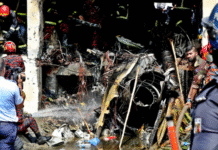
Many new recruits come from educated and relatively wealthy families
After a decade of dormancy, Islamist militant groups in Bangladesh are showing signs of revival. Based on recent investigations by Bangladeshi authorities, militants from at least two banned outfits, namely Jama’atul Mujahideen Bangladesh (JMB) and Ansarullah Bangla Team (ABT), have revived their organisational capabilities and are preparing for attacks in the country. This includes targeted assassinations involving individuals whom they consider apostates or obstacles to establishing an Islamic State in Bangladesh.
The rise of the Islamic State of Iraq and Greater Syria (ISIS) and the launch of Al Qaeda’s South Asia chapter, also known as Al Qaeda in the Indian Subcontinent (AQIS) have further led to increasing militant activism in Bangladesh.
Since ISIS declared the establishment of the caliphate in June 2014, Bangladesh has witnessed the emergence of pro-ISIS outfits, pledges of allegiances to ISIS by these outfits, and recruitment drives carried out both online and on the ground on behalf of ISIS. This attests to ISIS’ rising influence in Bangladesh.
Furthermore, many members of the existing local militant groups are supporting ISIS and recruiting fighters into the Syrian theatres. In addition, a new militant platform called Jund al-Tawheed wal Khilafah (JTK, otherwise known as the ‘Soldiers of Monotheism and the Caliphate’) in Bangladesh is believed to have recruited a number of Bangladeshi nationals to fight in Syria.
Bangladeshi Islamist groups have formed a new umbrella organisation under the rubric of the ‘International Lions Force of Hindustan.’ The aim of this organisation is to bring militants from Pakistan, India, Bangladesh, and Myanmar, under its banner.
According to one report, in October 2014, a four-member team of ISIS from Syria visited the southeastern port city of Chittagong and met with the leaders from several local militant groups, including JMB, Huji, Hizb ut -Tahrir, and ABT. Police investigations revealed that the local militant groups were working in concert to establish a state based on Sharia (Islamic law) in Bangladesh by 2020, with the help of ISIS.
The recent pledges of allegiance by Bangladeshi militants to Abu Bakr al Baghdadi are a significant indication of ISIS’ impact in Bangladesh. In August 2014, an English language video entitled ‘Muslims in Bangladesh give bayah to the caliph Ibrahim (Hafizahullah)’ surfaced on YouTube, with five masked individuals declaring their allegiance to ISIS’ leader.
In October 2014, another video surfaced online, featuring the newly-emerged group called Jund al-Tawheed wal Khilafah (JTK). In the video, members of JTK are seen pledging their allegiance to Abu Bakr al Baghdadi. In the video, the members of the group also stated that they were seeking recruits from Bangladesh and expressed intentions to raise funds for militant activities in South Asia for establishing a new “caliphate” called ‘Hind’. Furthermore, JTK called on all Bangladeshi Muslims to participate in armed jihad, and to contribute financially to the cause. The group also declared that it is making preparations for ‘Ghazwatul Hind’ or the ‘Final Battle of Hind’ in the Indian subcontinent, with an eye to establishing an ‘Islamic State’ encompassing Pakistan, India, Bangladesh, and Myanmar. Bangladeshi authorities suspect that JTK is the key platform for recruiting Bangladeshi militants bound for the Syrian battlefield.
ISIS RECRUITMENT
ISIS recruits in Bangladesh are mostly drawn from existing local militant groups, comprising returnees of the Anti-Soviet Afghan jihad. While ISIS cells in Bangladesh benefit from ties to their local parent organisations such as JMB and ABT, it is highly likely that they operate with some degree of autonomy. This enables ISIS cells to harness the combined expertise and networks of more than a dozen militant groups, with various levels of capability.
Source: Today Online









